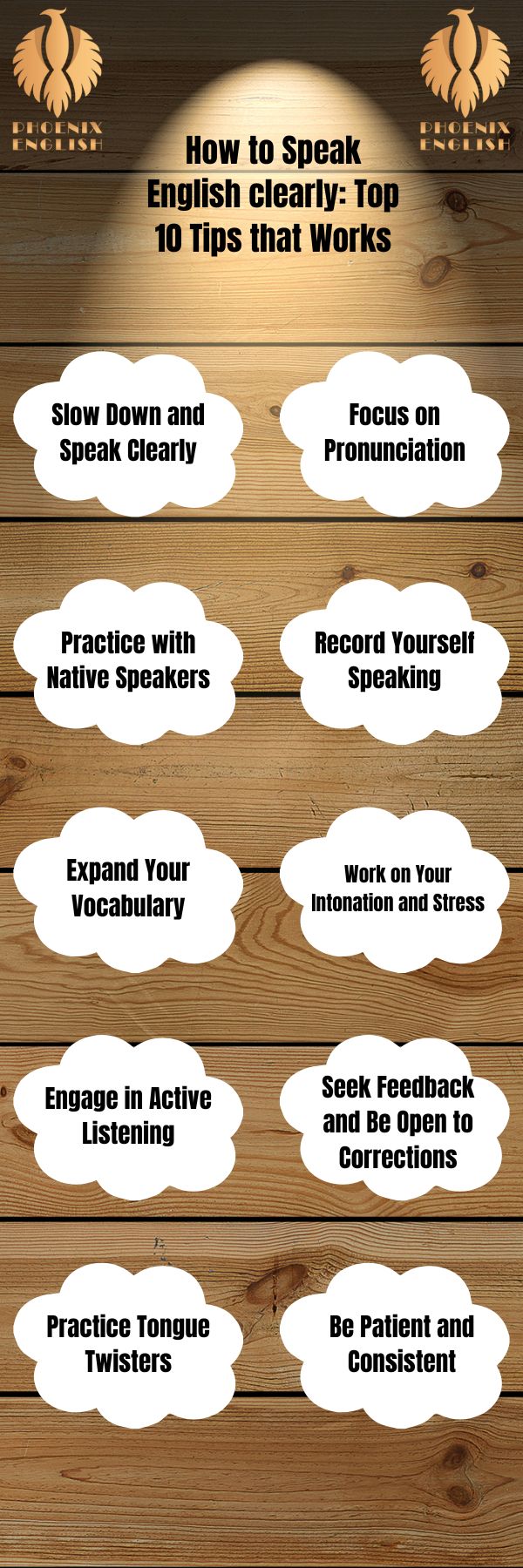When I initially started studying English, I frequently made mistakes in words, had trouble pronouncing words correctly, and felt self-conscious about my accent. I eventually learned several useful techniques that improved the clarity of my English speech.
So let’s answer this question! How to speak English clearly? First, you need to slow down your speech to enhance pronunciation, then practice with native speakers for real-time feedback or use new technologies like AI, and finally record yourself to identify areas for improvement. Expanding your vocabulary and working on your intonation and stress patterns are also crucial.
I have 10 tips for you that can really help you improve your speaking and speak clearly.
In the hopes that they would benefit you as much as
they did me, I’d like to share my top 10 suggestions with you.
How To Speak English Clearly: Top 10 Tips That Works

1. Slow Down and Speak Clearly
The most crucial thing I discovered was the need to slow down. My pronunciation would weaken and my sentences would frequently become garbled when I talked too rapidly.
I allowed myself more time to consider each word and say it correctly by slowing down. It also made it simpler for others to comprehend. I became much more clear-spoken by speaking slowly in both regular conversations and language practice sessions.
To expand on this, I employed a number of strategies to incorporate slowing down naturally into my speech. Making intentional pauses within and between phrases, particularly after key ideas, was one technique.
Another method that I found effective was to picture my speech as a river that was flowing. Like water that runs slowly without rushing, I tried to speak in a steady tone.
This image in my head allowed me to move at a steady pace without rushing. Speaking slowly became second nature to me over time, and I discovered that my listeners valued the thoughtfulness and clarity of my words.
You might also enjoy: How To Improve English Speaking Skills: My 10 Tips
2. Focus on Pronunciation

For communication to be understood, pronunciation must be accurate. I listened to native speakers for a long time and tried to replicate their pronunciation.
Internet tools, such as language study applications and YouTube videos, were particularly useful. In order to comprehend how various sounds are formed, I also used phonetic guides.
For me, it was quite helpful to break words down into smaller components and practice each syllable separately.
I worked on phonetic exercises to improve my comprehension of pronunciation. For instance, I worked on minimum pairings, which are words like ship and sheep that vary by only one sound.
I was able to sharpen my hearing for minute variations in sound and enhance my articulation as a result.
In order to compare my pronunciation to that of native speakers, I also videotaped myself saying these pairings. I also looked at the International Phonetic Alphabet (IPA), which gave sounds a distinct graphic representation.
Acquiring knowledge of the IPA symbols for English sounds enabled me to recognize difficult pronunciations and methodically practice them.
This information was especially helpful when I came across new terms and wanted to swiftly ascertain how to pronounce them.
3. Practice with Native Speakers
One of the finest things I could do to get better at speaking English was to interact with native speakers. I took part in conversation groups and language exchange programs.
I was able to adjust to various speaking dialects and styles thanks to these exchanges. I also received immediate comments on my fluency and pronunciation.
Internet resources such as conversation exchange websites might be an excellent substitute if you are unable to communicate with native speakers.
In my experience, interacting with native speakers allowed me to fully appreciate the cultural subtleties of the language in addition to providing me with a learning opportunity.
My grasp of English was improved by the idioms, slang, and cultural allusions I picked up.
Furthermore, conversing casually about a range of subjects—including interests, current affairs, and personal experiences—improved my ability to talk clearly and effortlessly. Observing native speakers was another effective strategy.
When you shadow a native speaker, you mimic their speech as nearly as you can, paying attention to rhythm, intonation, and pronunciation. With the use of this approach, I was able to absorb the English language’s natural flow and improve the authenticity of my speaking.
4. Record Yourself Speaking

Recording myself was a game-changer. I started by reading aloud from books, articles, or any written information I could locate. After hearing the recordings, I was able to pinpoint my areas of weakness. I could hear the errors that I was making and try to fix them.
I saw noticeable improvement each time, which really increased my confidence. In order to optimize this exercise, I used a methodical approach.
To push myself with new language and sentence structures, I read aloud a variety of literature, such as technical writings, novels, and dialogues.
I listened to the audio after recording and made notes on some things that needed work, including intonation patterns, ambiguous consonants, or vowel sounds. I also tried a variety of speaking situations.
I rehearsed storytelling, presenting, and conducting make-believe dialogues, for example. This diversity allowed me to become more flexible in my communication and adjust my speaking style to various situations.
My development was further expedited by sending some of these recordings to language partners or reliable friends for feedback.
5. Expand Your Vocabulary
A little vocabulary might make it difficult to communicate clearly. Every day, I made it a point to learn new terms and comprehend how to use them correctly.
My extensive reading of books, newspapers, and internet articles introduced me to a wide range of terminology. I jotted down new terms, definitions, and sample phrases in a vocabulary notebook.
This exercise increased my vocabulary and enhanced my linguistic abilities as a whole. I employed many techniques to efficiently increase my vocabulary.
One approach was to classify newly created words into themes, including those pertaining to emotions, employment, or tourism.
This made it simpler to recall and use them appropriately. In order to help me remember new terms and their definitions, I also made flashcards and used Anki and other applications to routinely review them.
Finding word families to be beneficial was another strategy I discovered. Having a deeper understanding of a word’s base and associated forms—such as create, creation, creative, and creatively—allowed me to see trends and expand my vocabulary.
I also tried to include new terms in my work and interactions on a regular basis, which helped me retain the meaning and expand my vocabulary.
6. Work on Your Intonation and Stress
Stress and intonation are important factors in how well we are understood. I saw how natural speakers emphasize particular syllables or words and change the pitch of their speech.
Because English is a stress-timed language, some of its syllables are longer and more emphasized than others, and vice versa. My speech became more understandable and more natural as a result of practicing this pace.
It was enjoyable and instructive for me to practice intonation and stress patterns using poems and songs.
I researched the patterns of spontaneous speech in several circumstances to improve my intonation and stress management abilities.
For instance, I noticed that speakers would employ descending intonation for assertions and ascending intonation for inquiries. In addition, I worked on emphasizing crucial details in phrases with stress.
I may make my speech simpler to follow and more entertaining by emphasizing essential terms. phrase stress—the way some words in a phrase are stressed more than others—was another thing I saw.
By using these prosody techniques, I was able to make my English seem more expressive and livelier.
7. Engage in Active Listening

I was able to comprehend how English is spoken in various circumstances because of active listening. I tuned in to English radio stations, watched movies, and listened to podcasts.
I was able to become more used to different dialects and slang terms because to this exposure. In an effort to seem more natural when I spoke, I also tried to emulate what I heard.
Active listening improves my comprehension of and capacity to mimic clear communication. I emphasized listening for specific details and general understanding to improve my active listening abilities.
When listening to a podcast, for instance, I would concentrate on the key points, the details that support them, and any new terms or idioms.
My ability to follow complicated talks and my listening comprehension both improved as a result of this. Additionally, I practiced participatory listening. For example, I might play a little audio sample, describe my thoughts, and respond to inquiries.
My comprehension and memory of the subject matter were strengthened by this exercise. I also took part in English-language conversations and debates, which further refined my active listening abilities by requiring me to pay close attention and reply correctly.
You might also enjoy: Top 100 Commonly Used Verbs That Start With T [2024]
8. Seek Feedback and Be Open to Corrections
Positive criticism is priceless. I asked acquaintances who knew a lot about English, teachers, and language exchange partners for their opinions. It was important to be willing to change and be receptive to criticism.
Although taking criticism might be tough at times, I’ve come to understand that it’s necessary for my development. I improved my general speaking abilities, intonation, and pronunciation by using the feedback.
I made sure there were open lines of communication between my professors and language partners in order to foster a helpful feedback environment. I urged them to identify certain locations in need of development and offer doable solutions. I provided them with comments on their language acquisition in exchange, resulting in a win-win situation.
I also maintained a feedback log in which I recorded the suggestions and edits I got. This allowed me to monitor my development and spot problems that kept coming up and required additional care.
By routinely reflecting on this input, I was able to establish specific objectives and concentrate my practice on the areas that most needed development.
9. Practice Tongue Twisters
Tongue twisters are a great way to work on your articulation. They improve pronunciation and test your oral muscles. I used to practice tongue twisters on a daily basis, working my way up to more difficult ones.
Through this exercise, I was able to regulate my mouth motions and improve the clarity of my voice. She sells seashells by the seashore How much wood would a woodchuck chuck if a woodchuck could chuck wood? were a couple of my faves.
I included tongue twisters in my everyday warm-up to get the most out of them. I took a few minutes to perfect my articulation and stretch my vocal cords by repeating tongue twisters before having conversations or practicing my language skills. I also experimented with creating my own tongue twisters using challenging sounds and combinations.
This creative exercise allowed me to target specific areas of difficulty and made practicing more enjoyable. Sharing these custom tongue twisters with friends and language partners added a fun, competitive element to our practice sessions.
10. Be Patient and Consistent

The process of becoming more fluent in spoken English takes time and demands perseverance. I made reasonable objectives and gradually worked toward them. The secret was to practice often.
Even if it was just for a little while, I made it a point to speak English every single day. Keeping track of my improvement encouraged me to press on.
I told myself that every little thing I did helped me get better overall. I included English practice into my daily schedule to keep things consistent.
For instance, I designate particular periods of the day for speaking, listening, and reading. I was able to maintain my language proficiency and make constant development thanks to this methodical approach.
I also acknowledged and rejoiced in all of my accomplishments, no matter how minor. Acknowledging my improvement gave me motivation and reaffirmed the notion that progress could be made with consistent work.
Additionally, I made connections with other language learners who had similar objectives, and we supported and encouraged one another along the way as we learned the language.
Additional Tips for Speaking English Clearly

There are a few more techniques and methods that can help you improve your language abilities even more than the fundamentals covered in my list of the top ten recommendations for speaking English correctly. Here are a few more pointers that have helped me in my journey:
Use Visual Aids and Gestures
Incorporating visual aids and gestures into my communication helped me convey my message more clearly. When speaking, I used hand movements and facial expressions to emphasize key points and illustrate concepts.
This not only made my speech more engaging but also helped listeners understand me better. Visual aids, such as pictures, diagrams, and slides, were particularly useful during presentations and explanations.
Practice with Different Speaking Scenarios
Putting myself in a variety of speaking situations increased my confidence and capacity to adjust. I rehearsed presentations, interviews, formal and casual talks, and even storytelling.
The various language proficiency and formality levels needed for each situation increased my ability to use English in a variety of ways. Practice these many scenarios in a lighthearted and productive way by role-playing with friends or language partners.
Join Online Language Communities
Online language forums offered a setting for ongoing practice and communication with both native speakers and other students. I could ask questions, exchange experiences, and get feedback on sites like Reddit, language learning forums, and social media groups.
These forums also provided tools that kept me interested and motivated, such as language challenges and discussion threads.
Watch and Imitate English Speakers
Seeing English speakers in films, TV shows, and speeches has improved my understanding of how people use language in everyday contexts. I observed their tone, body language, and conversational techniques.
My speaking became more genuine and organic as a result of mimicking their facial expressions and spoken patterns. I was also exposed to a range of dialects and accents via this exercise, which improved my listening abilities.
Participate in Public Speaking
Engaging in public speaking events like speeches, presentations, and debates really increased my clarity and confidence. I had to get my thoughts in order, communicate my views concisely, and interact with the audience when I spoke in public.
Joining organizations like Toastmasters provides a helpful setting for
honing these abilities. I grew more accustomed to facing various speaking issues and public speaking over time.
You might also enjoy: Top 100 Commonly Used Verbs That Start With D [2024]
Learn Idiomatic Expressions and Colloquialisms
Using and comprehending idioms and colloquialisms improved the naturalness and relatability of my communication. I made a list of frequently used expressions and idioms and worked on using them in my talks.
This increased my vocabulary and improved my ability to communicate with native speakers because idiomatic terms are a natural component of spoken language.
Focus on Fluency Over Perfection
Although clarity is crucial, I’ve come to realize that perfection isn’t always achievable. Aiming for fluency means putting less emphasis on worrying about making mistakes and more on efficiently conveying my ideas.
I saw my mistakes as a necessary component of learning and seized the chance to get better. By adopting this perspective, I was able to talk more freely and confidently and my fear was alleviated.
Engage in Reflective Practice
My reflective practice consisted of evaluating my language abilities on a regular basis and establishing clear objectives for development. I would pause after practice sessions or discussions to consider what went well and what might be better.
My ability to recognize trends and places that need greater attention was aided by my self-awareness. Establishing SMART (Specific, Measurable, Achievable, Relevant, Time-bound) objectives gave me a clear path forward for improving my language skills.
Use Technology to Your Advantage
Technology provided a multitude of tools and resources for language acquisition. To augment my practice, I used online classes, speech recognition software, and language learning applications.
Rosetta Stone, Babbel, and Duolingo are a few examples of apps that provide interactive activities and pronunciation feedback.
With speech recognition software like Google Voice or Siri, I could practice speaking and get instant feedback on my accuracy and intelligibility.
Stay Positive and Enjoy the Journey
My success was greatly aided by keeping a cheerful outlook and taking pleasure in the learning process. Although learning a language might be difficult at times, it can also be a very fulfilling experience.
I kept myself motivated by periodically reminding myself of my objectives and the reasons I wanted to get better at English.
I also praised my accomplishments, no matter how minor. Having curiosity and excitement for the voyage kept me interested and made the process fun.
Conclusion
I gradually gained confidence in my ability to speak English clearly by referring to these recommendations. Keep in mind that every person has a different learning process, so figure out what works best for you and stick with it.
Your spoken English will significantly improve with patience, commitment, and the appropriate techniques. To improve your English and gain more confidence,
practice, be patient, and most of all, have fun while learning.

Hi, welcome to my blog! My name is Omid and I am thrilled to have you here! I am an English language teacher with 12 years of experience and hold multiple international certifications (TESOL, IELTS, TOEFL, PTE, CELTA). Additionally, I hold a PhD in Applied Linguistics with a specialization in Teaching English as a Second Language (TESL), which fuels my passion for teaching English and assisting others in mastering the language. To me, nothing is more rewarding than helping individuals enhance their English language abilities through various methods. So, let’s embark on this journey of learning English together.




